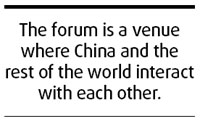Policy to stay
(China Daily)
Updated: 2008-04-14 07:14
Updated: 2008-04-14 07:14
President Hu Jintao told the world at the Boao Forum for Asia Annual Conference 2008 on Saturday that the country will continue to adhere to the reform and opening up policy.
Hainan, where the annual gathering dubbed as the Asian version of Davos Forum convenes, is one of the best showcases of the policy. Designating the island and other four cities - Shenzhen, Zhuhai, Shantou and Xiamen - as special economic zones, the country has succeeded in experimenting with its reform and opening up policy.

The Third Plenary Session of the 11th Central Committee of the Communist Party of China (CPC) in late 1978 heralded a new era of China that was committed to reforming and opening itself to the outside world. The policy has transformed the most populous nation into the world's fourth largest economy in the past three decades.
The country's success in blazing a new trail in building socialism with Chinese characteristics has lifted millions of its people out of poverty and made significant contributions to world development and prosperity.
Never before has China been so closely bound with the rest of the world as it is today.
In Boao, President Hu's words were the latest commitment of the Chinese government to opening to the outside world.
The largest developing country in the world, China will, for a long time to come, put development and poverty reduction at the top of its agenda. China's blueprint for 2020 has set the goal of building a moderately prosperous society.
Today, the country is still integrating itself into the world. China cannot develop in isolation, nor can the world prosper and maintain stability without China.
At the 30th anniversary of the country's reform and opening up to the outside world, the government is resolved to keep the strategy on track now and in the future.
The Boao Forum is one of the venues where China and the rest of the world interact with each other. Designated for discussing Asia's issues, the annual gathering has attracted an expanding legion of politicians, business people and nongovernmental organizations.
The reason is simple: every member of the global village is under the sway of the good, the bad and the ugly of globalization.
(China Daily 04/14/2008 page4)
|
||
|
||
|
|
|
|
